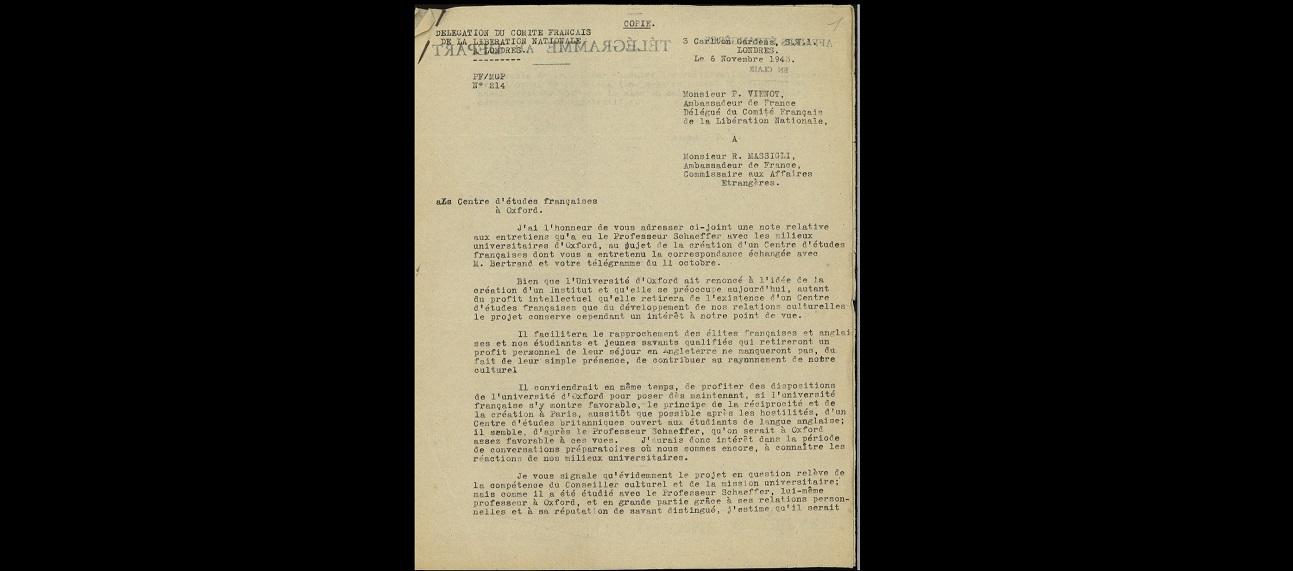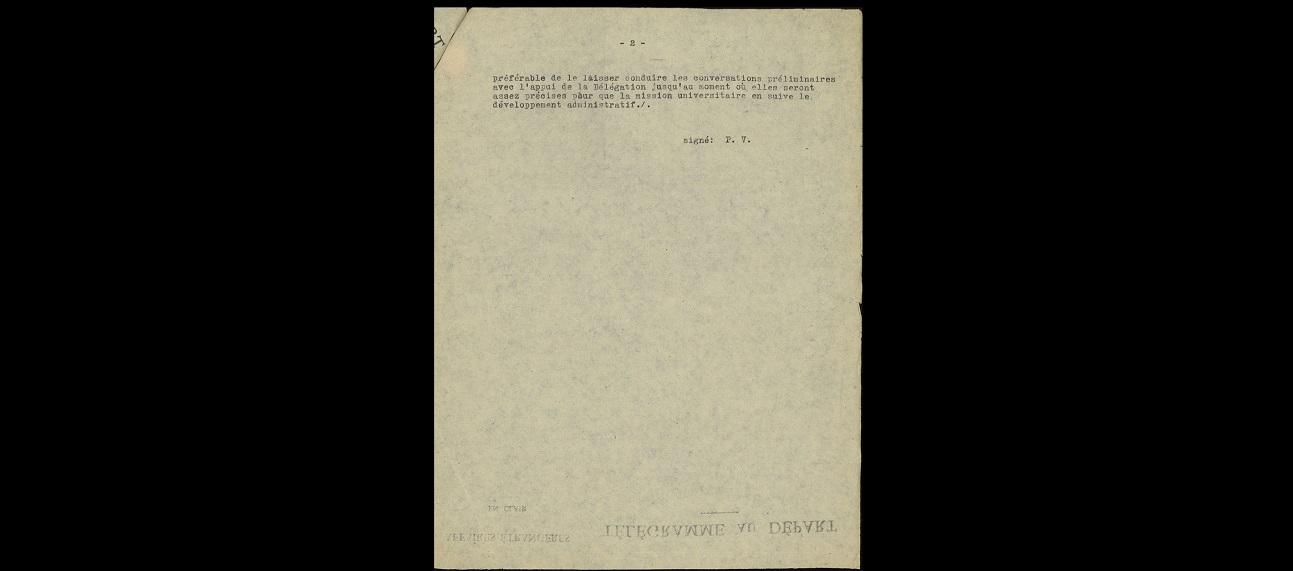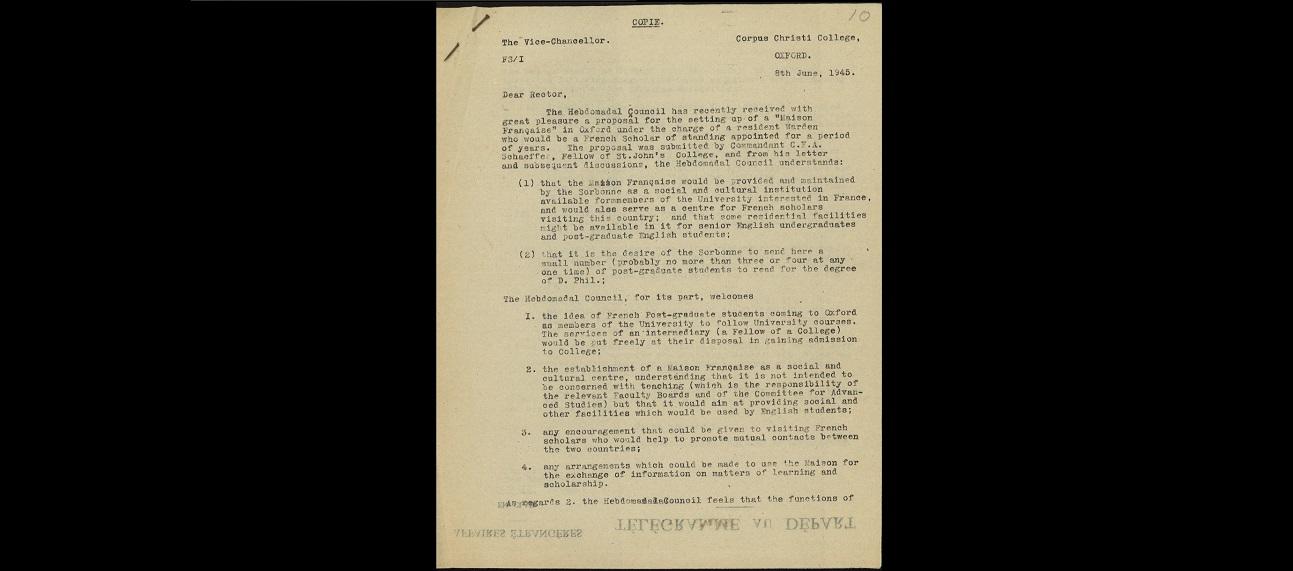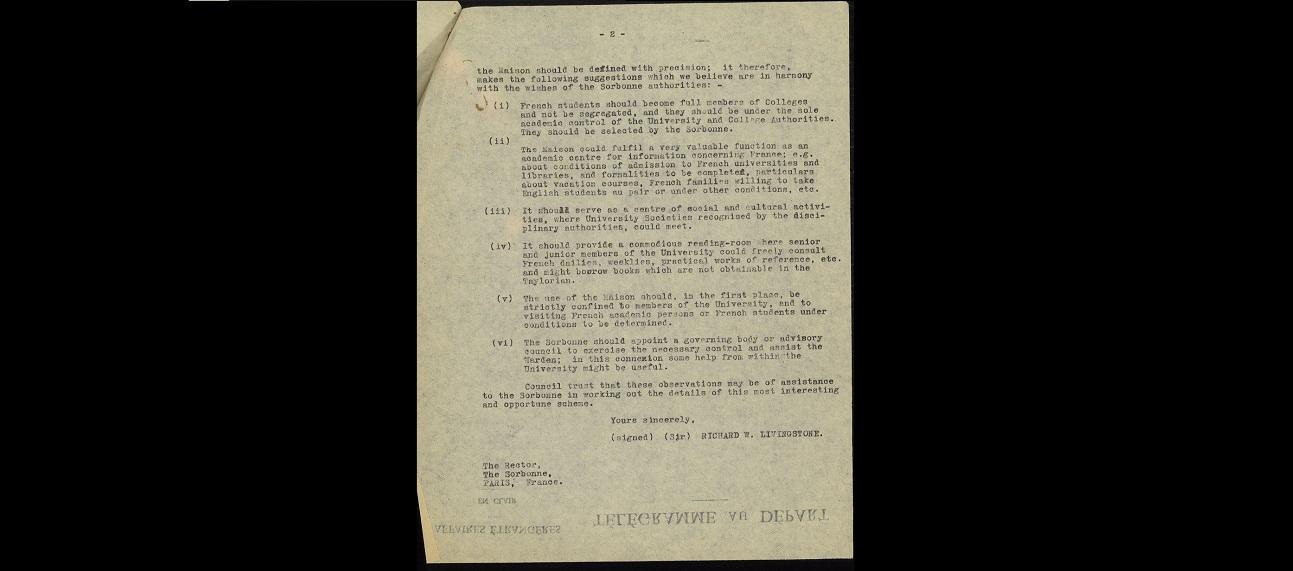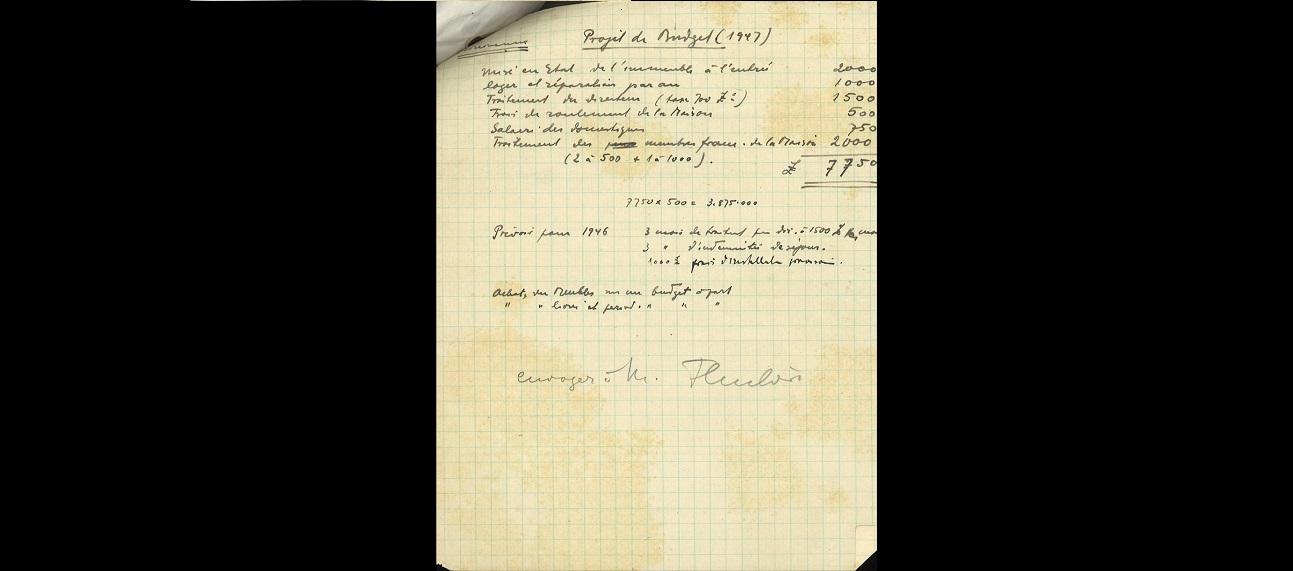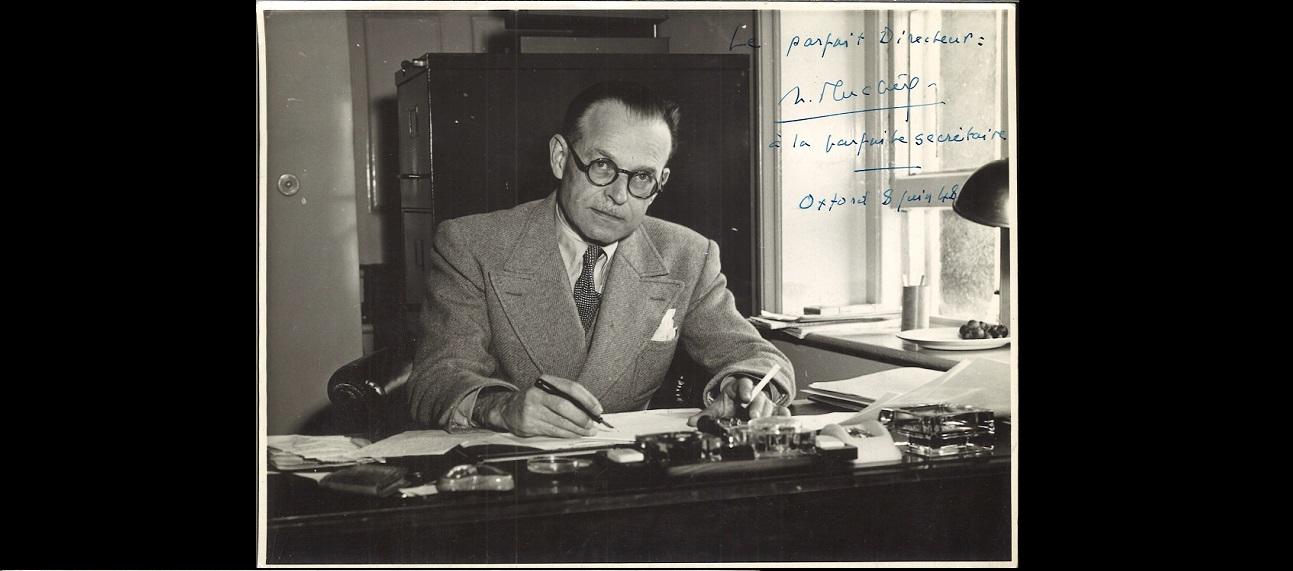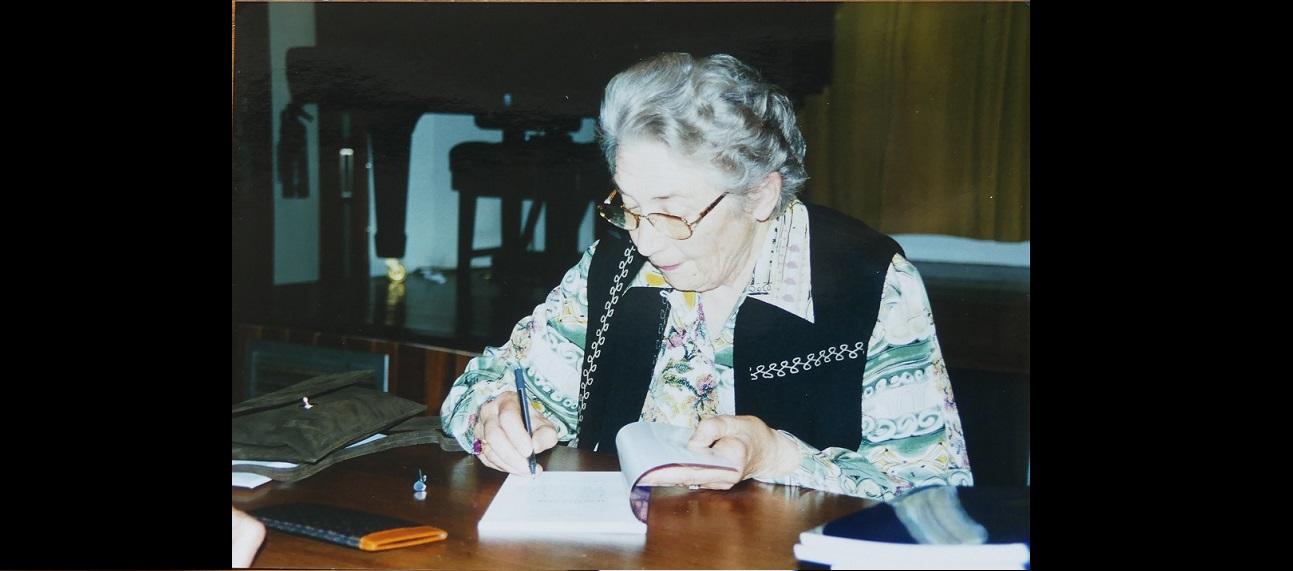I. The Founding
I. The Founding
Officially created in October 1946, under the triple supervision of the University of Oxford, the University of Paris and the French Ministry of Foreign Affairs, the project of a "Maison Française" in Oxford had been supported for several years in academic and diplomatic circles by the archaeologist Claude Schaeffer (St John’s), the Islamic scholar H. A. R. Gibb (St John’s) and the Professor of International Politics, Alfred Zimmern (New College). Their vision was one of scientific cooperation between academics and students from both countries: "there will be among us and among ‘them [ i.e. the English] a handful of responsible men, capable of building the strong links that our two peoples need to subsist in the dignity of a truly living European civilisation".
1. 1940-1943: Institute, Centre or “Maison”?
Letter from Pierre Viénot to René Massigli, 6 November 1943 (copy)
© MFO - MFO Archives
This letter is the oldest in the MFO's heritage archive, known as the "Schaeffer collection”. Dated 6 November 1943, it was sent by Pierre Viénot, ambassador of the France Libre in London, to René Massigli, then Commissioner for Foreign Affairs in Algiers. The text mentions discussions concerning the creation of a "centre for French studies" in Oxford. The Schaeffer collection, named after the famous archaeologist Claude Frédéric-Armand Schaeffer (1898-1982), covers the years 1943-1950. Sent to England in May 1940, Schaeffer later joined the Free French Naval Forces. He was awarded an Honorary Doctorate by the University of Oxford and a Fellowship at St John's in 1942; it is now known that his scientific work allowed him to work at Bletchley Park. Along with H. A. R. Gibb and Alfred Zimmern, Schaeffer was a founding father of the Maison Française project. Between 1944 and 1946, he was commissioned by the Provisional Government to lead the three-way negotiations between Oxford, the University of Paris and the Direction Générale des Relations Culturelles (Ministry of Foreign Affairs), which led to the enactment of the decree founding the MFO on 22 October 1946. The first part of the Schaeffer collection, called the "MFO Birth Certificates", contains 21 documents numbered by Schaeffer, mostly copies of letters found by his widow, Odile Schaeffer, four years after his death, and given to the MFO. The second part of the collection contains more than 80 documents (letters, notes, telegrams, budgets, reports), making it possible to trace the birth of the Maison.
In 1940, the idea of creating a "French Institute in Oxford" was first considered as a tribute to French culture, under threat during the war. On the English side, the idea was supported by Alfred Zimmern (New College) and H. A. R. Gibb (St John's); on the French side it was backed by Claude Schaeffer (St John's). The three had a meeting in London in 1941 with René Cassin, which did not have the desired effect, since Schaeffer later reported that Cassin had made it clear to them on this occasion that, in exchange for his support, General de Gaulle would expect an Honorary Doctorate from Oxford. This is the only time de Gaulle’s name has been found so far in the 1940s correspondence relating to the founding of the MFO.
The talks did not resume until the end of 1943, this time with the ambassadors Pierre Viénot and then, following Viénot’s death in July 1944, René Massigli. At the Libération, the idea of creating a cultural institute was abandoned. The University of Oxford, concerned about the “influx of foreign professors and students, students from the Empire and from the United States", jeopardising "its English character and its status as a university intended primarily for the English", was wary of foreign influences. The idea of a rapprochement with France survived, no longer through an institute but through an academic institution called "Centre d'Études Françaises", or "Centre d'Études Français", or "Centre Français d'Études", dedicated to the study of British institutions. The creation of a fully-fledged college, "French hall of residence" or "French House" was then contemplated as a college composed solely of postgraduates. However, after the idea of an institute, the idea of a college was in turn abandoned in favour of a “social and documentation centre” with no pedagogical function. The term house/”Maison” - a reference to the residential functions of the colleges of Oxford and Cambridge - was nevertheless retained, though there was some hesitation between "Maison Française d'Oxford", "Maison Française à Oxford" and "Maison de France".
The Maison Française project was thus marked from the outset by a tension between at least three functions: cultural (institute), scientific and pedagogical (study centre), or social and service (“Maison”). According to Claude Schaeffer, advocate of the "scientific" understanding, the MFO had to be above all the "Sorbonne's embassy in Oxford": "The “Maison” cannot and must not continue to devote its main activity to...propaganda in the cause of high culture. This, by the way, is the domain of our Cultural Advisor in London. The mission of the “Maison”, and its most eminent and pressing mission, is to attract to Oxford our young scholars, for whom the stay at this university will be profitable, enableing them to build relations which will benefit them in the future.” Not everyone thought this way. In 1948, Jean Lequiller, the future director of the MFO, but then a correspondent for Le Monde in London, mentioned the MFO in an article entitled "French Culture in Britain" without saying a word about its role in facilitating academic relations. The “Maison”, simply described as "charming", is presented as an additional pawn in France's cultural strategy in England.
2. 1944-1945: implementation
Letter from Sir Richard Winn Livingstone to Gustave Roussy, 12 June 1945 (copy)
© University of Oxford - MFO Archives
In this letter dated 8 June 1945, the Vice-Chancellor of the University of Oxford, Sir Richard Winn Livingstone, informed his Parisian counterpart Gustave Roussy, Rector of the University of Paris, that the University's Hebdomadal Council had just approved the project for a French House in Oxford. He also made several recommendations, which he hoped the Council of the University of Paris would approve. The letter foreshadows most of the terms of the decree of 22 October 1946. However, it was not sent by Livingstone to Roussy, but passed on to Claude Schaeffer, who, on his return to Paris, had to act as an intermediary: the crisis, which saw France and England fighting what resembled a war in Syria, prevented, at that precise moment, any direct communication between the Parisian and Oxonian university authorities. The letter thus illustrates the diplomatic difficulties that sometimes hampered the history of the founding of the MFO.
The second half of 1944 gave a new lease of life to the Maison Française project. After a visit by H. A. R. Gibb to Algiers, Claude Schaeffer was officially mandated by the Provisional Government on 8 September to negotiate with the University of Oxford, following the agreement of Rear-Admiral Robert, who commanded the Free French Naval Forces to which Schaeffer still belonged.
The autumn term of 1944 saw the appointment of Sir Richard Winn Livingstone as Vice-Chancellor of the University of Oxford; he was a strong supporter of the project and a friend of Gibb and Schaeffer (“Livingstone” was the alias used by Schaeffer at Bletchley Park). Schaeffer then made the first contacts with Gustave Roussy, who had been reinstated as Rector of the University of Paris, and who was in turn enthusiastic, provided that the project remained "purely academic".
At the beginning of 1945, Schaeffer therefore began shuttle diplomacy with Livingstone, and then negotiated a first budget with the Direction Générale des Relations Culturelles, headed by Henri Laugier. The project finally obtained the agreement of the Oxford Hebdomadal Council at the end of May 1945, with some suggestions: the proposal meant that the two projects of institute and college
were definitively abandoned. The Maison would be a cultural and social outpost of the Sorbonne, without a teaching mission, intended for members of the University of Oxford "interested in France". In return, Oxford would welcome French students in its colleges.
On the other hand, two new ideas emerged: the Maison Française should also host meetings of associations recognised by the University (societies or clubs) and act as an information centre to facilitate the travels of English students in France. They would go to the MFO to find information about French universities and libraries or summer schools, or to be put in touch with French families with whom they might reside for a period to improve their language skills. These two roles, which were initially essential from the Oxonian point of view - hosting clubs and providing a documentation centre - are often forgotten in later accounts.
Between May and October 1945, however, international politics cut short these talks. Despite the acceptance of the Hebdomadal Council's project by the University of Paris Council on 23 July, Gustave Roussy did not officially reply to Livingstone until 1 August. In the meantime, Claude Schaeffer tried to reassure Livingstone that “the association between France and Britain in the world” was far more important than “oil or a few naval and air bases in Syria”. However, the response from Paris was slow. Roussy's letter did not go through Schaeffer this time but through Ambassador René Massigli, who waited another two months before finally passing it on to Livingstone on 3 October.
Schaeffer then contacted the Minister Jean Marx, pleading the cause of the MFO, on the French side: "Each year, by training a small group of true connoisseurs of England, of its culture, of its way of reasoning and reacting, you would provide France with a body of precious specialists useable in the diplomatic, academic and administrative fields. You would also prepare for the country those men who are indispensable but until now too rare in France, who can forge a solid friendship with the best elements of this island people, despite the disputes that will no doubt occur in the course of everyday interactions between the two nations...".
Schaeffer would later allege technical reasons for the delay in communications, and Livingstone would politely mention that messages had been "much delayed in transit", but it was international politics that threatened the creation of the MFO in the summer of 1945 - an episode that was later widely ignored in order to maintain the myth of a perfect agreement between Paris and Oxford and a quick, efficient and virtually unopposed creation.
3. 1946: the committee period
Budget of the Maison Française, undated [May?] 1946
© MFO - MFO Archives
This draft budget, handwritten by Claude Schaeffer, is the first concrete working document relating to the establishment of the MFO. It is part of an undated note, but its three sections, "general organisation", "budget" and "appointment of the director", correspond to the agenda of the first meeting of the Parisian Steering Committee on 15 June 1946. This document exists in at least four different forms in the MFO archives, which shows its importance: a first copy annotated by Claude Schaeffer; a second copy, accompanied by a card from Odile Schaeffer, which incorporates the annotations of the first copy; a third copy, identical, but with H.A.R. Gibb's comments about the budget on the back. This is the only autograph document by Gibb in the MFO archives. Far from being a mere facilitator, it shows his intimate knowledge of the practical, technical and financial considerations prior to the start of the MFO. Finally, a typed copy of the note was kept by the first director, Henri Fluchère, as well as the envelope in which he received it at his home in Marseilles, 438 rue Paradis, postmarked 27 June 1946.
An important step in the creation of the Maison was the establishment of its governance, including two committees, one Parisian and one Oxonian. Originally, however, there was no provision for an Oxonian committee. This committee, whose official role was to help and advise the director, was in fact the result of a quarrel with the Taylor Institution, which clearly made it a condition for not vetoing the Maison Française project: "The action taken in this case will certainly serve as a precedent, and unless an endless series of foreign institutes in Oxford owing exclusive allegiance to foreign ministerial or quasi-ministerial bodies is envisaged it is vital to provide for the necessary control", as Alfred Ewert explained to the Registrar, Douglas Veale, in late 1945. The 'control' to be exercised over an institution seen as an emanation of a foreign power came from the Taylorian trustees, professors of foreign languages and civilisations, whose support was vital.
The idea of such a committee was therefore not submitted to Gustave Roussy until relatively late, in January 1946, but he accepted the principle immediately. It was composed of the Vice-Chancellor, the holder of the Maréchal Foch Chair of French Literature, the fellow responsible for integrating French students in the colleges, a member of the Hebdomadal Council, a representative of the curators of the Taylor Institution, two members of the Faculty of Medieval and Modern Languages and a member of the Faculty of Modern History.
On the Paris side, things were already well underway and the composition of the committee was decided by decree of the University of Paris on 5 April 1946, i.e. one year before the Oxonian committee (14 May 1947). It included the Rector of the Paris Académie, the Director-General of Cultural Relations (Ministry of Foreign Affairs), the Director of Cultural Relations with Foreign Countries (Ministry of National Education), the Director of the Office National des Universités et Grandes Écoles, the Deans of the Faculties of Arts and Humanities, Science and Law of the Sorbonne, Floris Delattre (Professor of English Language and Literature at the Sorbonne) and Claude Schaeffer. A Parisian resident, such as the Director of the British Institute, was at one point considered to represent Oxford, but in the end, Cecil Maurice Bowra, the flamboyant Warden of Wadham College, was appointed.
The first date that can be considered as the date of creation of the Maison Française d'Oxford is therefore 15 June 1946, the first meeting of the Parisian Steering Committee. This meeting should have been held on 18 May but was postponed to 15 June due to Bowra's unavailability. When the general organisation of the Maison, the budget and the appointment of the first director, all three duly prepared by Schaeffer, were put on the agenda, this marked the end of the official mission to which he had devoted so much effort for several years. His letter to Gustave Roussy reads like a farewell letter, on "this 15 June 1946, which saw the birth of the Maison Française d'Oxford".
4. 1946-1947 : Enter Mr and Mrs Fluchère
Henri Fluchère (1948)
Artist : Westmoreland Studios
Front: [Stamp] "Photography by/Westmoreland Studios/130 High St, Oxford/'phone 48186 [Pencil] 3358F"
© Westmoreland Studios - MFO Archives
Marie-Louise Gravagne Fluchère (1996)
Artist unknown - MFO Archive
Photographs reproduced with Isabelle Barber’s permission
Fifty years separate these two photographs of the Fluchère couple. The first, very elaborate (cigarette out, white paper...), shows Henri Fluchère, a perfect replica of the Oxford don, in a tweed suit at his office at 72 Woodstock Road. Dated 8 June 1948 in blue ink, just four days after the official inauguration of the MFO, it bears an old-fashioned dedication to his assistant, probably Catherine Doctorow. The white frame that still surrounds it in the MFO archives suggests that some of the photographs were intended to be received as gifts, and perhaps Henri Fluchère had them prepared to thank the staff for their investment in the preparations for the inauguration. The second photograph, taken in 1996 during the Gaudy (a ceremony marking the fiftieth anniversary of the Maison) shows Marie-Louise Gravagne-Fluchère signing her book, La Maison Française à Oxford il y a cinquante ans (1946-1996). Hommage à Henri Fluchère Directeur-Fondateur. Marie-Louise Fluchère (second wife of Henri Fluchère, widower of Yvonne Le Norcy) joined the Maison Française in October 1948, initially as an assistant librarian. She married Henri Fluchère in 1959 and continued her career as a University Professor of English at Aix-Marseille University.
The second date that can be considered to mark the creation of the Maison Française is 22 October 1946 when the official decree by the University of Oxford was promulgated (published in the Oxford Gazette the following day). It was Oxford that took the initiative and promulgated the decree, but as the implementation and financing were French, the MFO is presented as reflecting the Parisian will: "Whereas the University of Paris desires to establish in Oxford a Maison Française [...]". The Oxford Times echoed this with the headline a "Paris Offer" and insisting on "a generous and noble gesture on the part of the University of Paris".
The choice of the first director concentrated all minds. It is not known how many candidates were considered. In any case, it was René Varin, the embassy's cultural advisor and an agrégé in English, who advised that priority be given to a specialist in English literature. Henri Fluchère, then a member of the board for the “agrégation”, where he had been co-opted by Floris Delattre, a member of the Parisian Steering Committee, was appointed at the committee's first meeting on 15 June 1946. It was Delattre himself who was responsible for presenting Henri Fluchère’s background to the committee.
Fluchère officially took office on 1 October of the same year. He was already 48 years old and did not have a doctorate, but he had many other assets, the most important being his knowledge of the Oxbridge college environment, since he had been a lecteur at Gonville and Caius College (Cambridge) between 1921 and 1925. He was an agrégé (1924) and a teacher at the Lycée Thiers, where he had Louis Ducreux as a pupil, and he was also a man of the theatre. In 1931 he founded the “Rideau Gris” company in Marseilles with Ducreux and André Roussin. Fluchère adapted plays from the English repertoire for a decade, while writing his own productions under the pseudonym Paul Rivert, which he used when he felt a publication was a little too sulphurous. Fluchère had contributed to the Cahiers du sud since 1925, and he already had produced prestigious translations of Jean Giono, Henry Miller, and T. S. Eliot. Finally, his commitment to the service of France was well known: he was mobilised in 1917 and joined the Résistance in 1944, for which he was the spokesman at the beginning of the academic year at Aix-Marseille University in 1945. Shortly after his appointment to Oxford, Fluchère became a town councillor and then mayor of Sainte-Tulle – in the Alpes-de-Haute-Provence – while continuing to serve as General Councillor for the canton of Manosque until the early 1950s.
A man of letters, a connoisseur of English culture, as well as of French literary and artistic circles, a member of the Résistance and a local political figure, Fluchère corresponded in every way to the ideal of the man of culture and conviction that the members of the Paris Committee were looking for, convinced of the need to find a 'humanist' rather than a 'man of science' for Oxford.
Fluchère was quickly gathered into the Oxford fold: in 1947 he was awarded an M.A. and Exeter College admitted him as a fellow. Correspondence from the late 1940s is full of praise for him. They admire his tact, his patience, his persistence when facing challenges, his energy and the successes he achieved in an environment that was reputedly difficult to enter, and which commanded admiration. The rodage of the MFO, a term used in the archives to designate the first months of operation of the Maison, thus continued without any conflicts of custom or tradition, as Henri Fluchère recalled in his first reports, but in rather disappointing material conditions.


